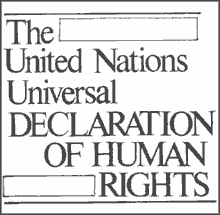|
35 TH ANNIVERSARY- 
Almost thirty-five years ago, governments from around the world gathered together and ratified the Universal Declaration of Human Rights. Emerging as it did from the ashes of a decade of conflict, the Declaration offered a ray of hope to a world whose spirit had nearly been broken. Its promise that all human beings are born free and equal, that every person is entitled to democratic rights and liberties, is as relevant today as it was when first drafted. Tragically, few people around the world are aware of universal declaration's existence and that the rights promised by the Declaration are enjoyed in very few countries. Canada has a better record than most signatory nations, despite our regretful historical and current discriminatory practices. December 10th, 1983 will be the 35th Anniversary of the Universal Declaration of Human Rights. There have been previous celebrations in Canada and elsewhere to draw notice to the existence of this document, specifically in 1968, 1973, and 1978. Each occasion has had some beneficial effect upon the slow process of advancing the objectives of the Universal Declaration and the subsequent United Nations Covenants and Conventions. The general public's awareness and concern about these international commitments are an essential dynamic in assuring that signatory governments, like Canada, live up to the contents of these statements of intent. In this context, a small group of human rights organizations began meeting in the early days of 1982, to consider how to mark the upcoming 35th anniversary. After a series of interviews and discussions with a wide range of community-based groups, a one-day consultation was organized for this past September 25th, in Ottawa. Sixty groups were invited to take part in the consultation. They were selected by the criterion that the groups should be national, federated (or umbrella) organizations for which human rights or civil liberties would be a prime concern. The positive response was one organization short of 100% and the CCLOW representative, Susan McCrae Vander Voet, met with colleagues from other women's organizations, as well as French and English-speaking Canadians from the union, labor, ethnic, religious, legal educational, human rights and government communities. |
| Back | Contents | Next |
